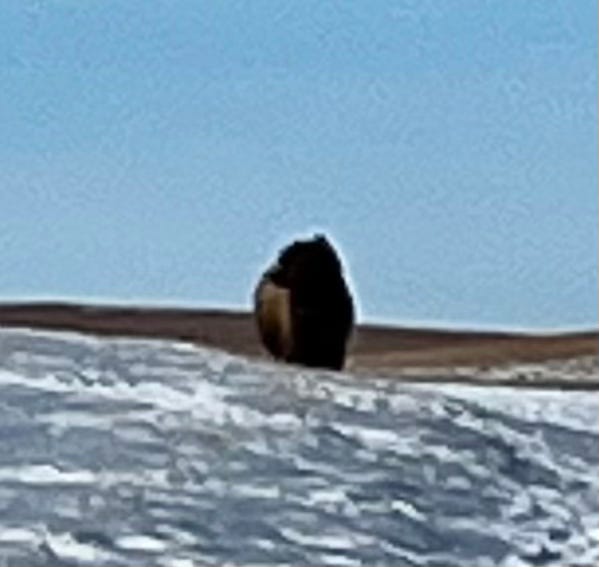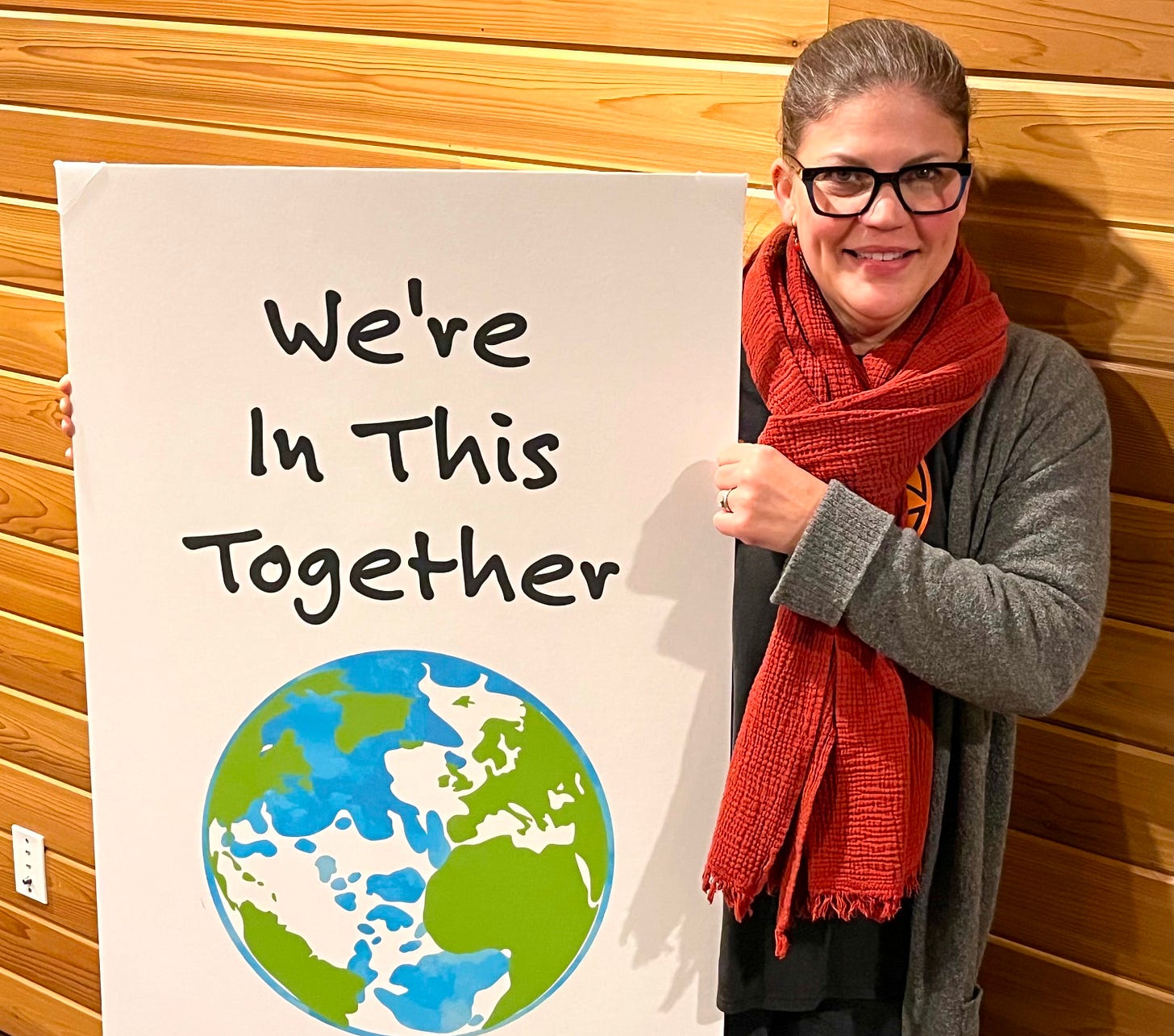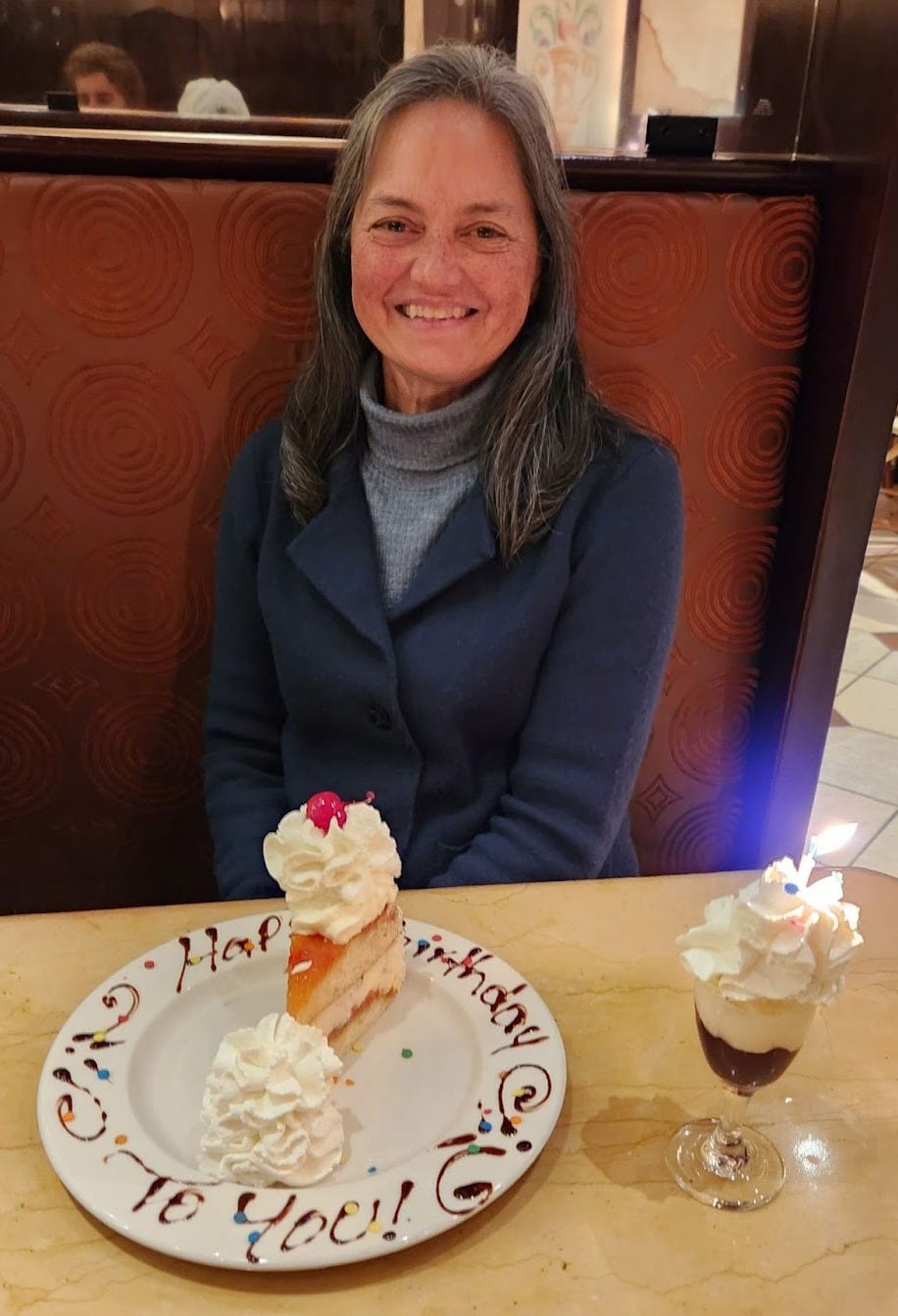This morning my Kansas City, Missouri weather station said it was 15 degrees, “feels like” 7. Even though it’s been dreary outside, I’m grateful and surprised to find myself dancing around the living room again. It seems joy hasn’t drained completely out of me - it just retreated into the subterranean depths for a while.
It's good timing to emerge from what some might call a “dark night of the soul” - or maybe this is just the eye of the storm (with the state of things it’s hard to know). There are many needs right now including, as my friend Bill reminded me, people who can offer a calming presence amidst chaos.
When the crowded refugee boats met with storms or pirates, if everyone panicked, all would be lost. But if even one person stayed calm, it was enough. It showed the way for everyone to survive. – Thich Nhat Hanh
I want to describe a bit of this “dissolution and emergence” experience because, though some have been through this long ago (maybe many times and it’s nothing new to them), some are just now reeling and I want to offer some hope.
To me the end of last year felt like receiving a series of disorienting blows - like being trampled by a psychological stampede of angry bison. Because of my work as a psychologist, I knew there were things I could do to help myself recover and I’m still intentionally engaging in these things. Some examples include connecting with historical and ancestral wisdom around times like these. I’m also increasing my engagement with existing resources and practices, expanding my repertoire to include new practices, reaching out to communities for greater collaboration, creativity, mutuality and reciprocity, and reassessing boundaries and priorities given new realities.
This emerging out of “dissolution” feels like a crossroads where I’m exchanging old beliefs, dreams and desires for what actually is and whatever might be. I’m finding new meaning in this.
It also gives me comfort knowing I’m not alone in it and I’m very grateful for my practice and various communities sharing the skills and insights that give me presence of mind to resource myself and share with others through the process. I’ve understood that a healthy dose of courage and a deeper kind of confidence would be required to fortify us for this journey.
One element of confidence that has been at a premium for quite a while now is trust. Between people and institutions in the US, trust has been elusive. That’s unfortunate, because folks who are more trusting tend to score higher on measures of well-being. So do countries with greater social trust.
Social trust refers to belief in the trustworthiness of others (including one’s government, leadership and institutions), or the benevolence of other human beings as a whole. As a psychologist, I know there are so many people out there who have never really had the luxury of trusting freely - and for good reason. Some may have a close-knit trusted circle of kin or chosen friends and family, but others have nobody they could say they deeply trust. For many the most difficult to trust is themselves.
To me this suggests that in a time of profound (largely instrumentally manufactured) distrust, dismay and division, building trust could be considered an act of resistance.
It’s tricky though because trust is something that can’t be instantly produced or forced. Like sleep or hunger, it arises out of many causes and conditions. We tend to be more trusting when we’re born to people with the capacity to care for our needs and for much of history this has largely been through serendipity, having a lot to do with time, place and context.
Trust also does involve a degree of risk, because we can’t know if we’re right to trust until we’ve trusted. If we have the courage or encouragement to be curious and observant we can learn through experience when it's wise to trust and when it's better to set a boundary.
Ultimately trust is an “inside job”. As one friend said, if well-being was purely about circumstances, nobody would die of exposure in a hot tub at an exclusive ski resort. Still, trust is easier to find when the circumstances are ideal. It would be a real kindness if we would each do what we can to avoid laying down obstacles for each other wherever possible.
When it comes to building trust, I’ve found it helpful to cultivate my own trustworthiness. For me this includes the obvious things like doing my best to act ethically with integrity, speak the truth as I understand it, and be honest with myself. It also includes increasing my self-awareness through connecting with my values, intentions, needs and limitations so that I can maintain reasonable boundaries and act responsibly and dependably.
Am I perfect at this? Far from it. Like anything, it's a practice. So part of trusting is also being reasonably forgiving of my own and others’ mistakes.
My contemplative practice has also been a way to maintain trust in a context that has felt increasingly hostile. During a wonderful meeting with the Center for the Human Spirit, Emerald Templeton (co-author of the book Contemplative Practices and Acts of Resistance in Higher Education) said that being in fellowship in community in third spaces has been a contemplative practice that helped her and her colleagues build social trust in a challenging work environment. This is something that resonates deeply with me.
“Mindfulness and contemplative practices must usher us into courage.” - Michelle C. Chatman, PhD, Cultural Anthropologist
Endeavoring to be worthy of trust doesn’t guarantee we will be trusted by others and we have to accept that. I’ve wondered though, how are others supposed to trust us when many of us are not authentically expressing who we are? In the last decade, how many of you have had the unsettling experience of learning that someone you thought you knew held beliefs that were much different than you assumed? It’s really shaken our trust and in some cases, destroyed relationships.
In a mainstream culture where vulnerability is experienced as weakness and mistakes are viewed as unacceptable, how can we be expected to be real with each other?
Perhaps at the heart of trust is a deeper sense of interconnection and belonging. Certainly trust is integral to love - a beneficial quality that is essential to our survival - the bedrock of meaningful lives and flourishing societies. Nearly all humans are born with the capacity to love and it’s far more expansive than we often assume. In general, love tends to be naturally expressed and self-reinforcing in good times, but in very challenging times the untrained mind tends to revert to “baser” survival instincts.
This selfless concern for another’s welfare can be a feeling we experience in the moment or a deeper, timeless and enduring way of being. It can be aspirational, such as an intention or wish, or it can be agentic; individual actions we take in response to a need or collective habits and practices that we engage in daily to co-create a culture of caring.
Love in its many forms has been correlated in the research with increased longevity, physical and mental health, decreased pain and suffering, better relationships, and a host of other benefits over the long-term. Collectively, strong relationships build social trust, which is a social determinant of health among nations.
When cruelty and division seem like the dominant narrative, how might we remember our innate ability, build capacity, and support each other in practicing love (and subsequently social trust) as a pathway to well-being?
I’ll write more about this in the paid version of our newsletter - it moves into the territory of what might be considered “political” (and the personal), so you might see the paywall as a kind of content warning. There will also be some additional resources and suggestions.
Some may feel they aren’t interested in political content, and if this is you, you might be glad to avoid this kind of content; however, I suspect chronic aversive reactivity toward hard truths is part of our dilemma. Learning to explore the bitter and the sweet together can help us gain understanding and find creative solutions to our problems.
Wishing You Love and Trust,
- Tracy, *a product of public school from kindergarten until graduate school
*I heard a podcast where Rebecca Solnit was introduced as “a product of public school from kindergarten until graduate school”. I too am a part of this club and I love the solidarity she is expressing in naming this.
The Midwest Alliance for Mindfulness wishes a happy posthumous birthday to our friend Cathan Kabrelian:
Cathan’s Celebration of Life was Saturday Feb 1 at the Overland Park Arboretum in Kansas.
She served as Co-Director of the NYCNVC/CCO Empathy Program and was a vital part of the CCO Leadership Team - Here is her NYCNVC/CCO Remembrance Gathering.
Upcoming Offerings
Spring Renewal Retreat with the MAM Team Saturday March 1, 2025 at Hollis Renewal Center
Unshakable Confidence: a DIY Guide with Pam Hausner & Tracy Ochester Tuesdays Mar 25 – Apr 29 at 6-8 pm Online
Recommended Resources and Happenings
Dr. Bill Hale is offering free guided meditation sessions online via Zoom through the month of February for beginners and experienced meditators. Thursday Feb. 20 & 27 at 11:00 – 11:30 am and 12:00 – 12:30 pm CST Join via Zoom: us02web.zoom.us/j/8251174787 Meeting ID: 825 117 4787 Password: ease
5-Day Self-Compassion Intensive March 23, 2025 at Sedona Mago with Chris Germer and Sydney Spears
Recovery Meditation Thursdays at 9 am at AIMwell Yoga with
Nettie ZanCommunity for Deepening Practice - Dying Into Life course starts March 6 and Self-Compassion for Shame course starts April 19
Non-Binary Panel discussion on Saturday, Mar. 8 from 3-5 pm at InterUrban ArtHouse
Ayllu Arts - nurturing creative vitality through performance, artistic collaboration, and ancient healing arts
Know Your Rights - Immigration Law Center
Find and contact elected officials - from usa.gov










